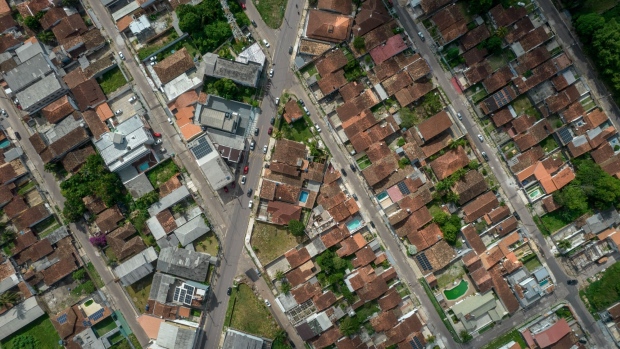Mar 28, 2024
Brazil Seeks Real Estate Market Boost as Lula Pushes for Growth
, Bloomberg News

(Bloomberg) -- Brazil is readying measures to boost the country’s real estate market amid pressure from President Luiz Inacio Lula da Silva to fuel economic growth.
The plan includes a push to expand the securitization of housing loans, people familiar with the matter said. One of the options being mulled is subsidizing part of the cost of securitizing bundles of housing loans held by banks, which could then be sold to funds and free up lenders’ balance sheets so they could lend more, the people said, asking not to be named discussing private information.
The measures, which seek to make the debt more attractive to banks and investors, are still being finalized and there are no details on how much the government could offer in financing, one person added.
Finance Minister Fernando Haddad said in an interview with a local radio station this week that the government is expected to release the new plan in the coming days.
“Banks will have an incentive to sell real estate portfolios, open up space on their balance sheets and offer more credit,” Haddad said.
The ministry declined to comment further on details of the plan.
Dwindling Savings
In Latin America’s largest economy, most of the funding for housing comes from the 735 billion reais ($148 billion) Brazilians hold in savings accounts. In 2023, they were behind more than half of the 994,000 housing loans granted, according to Abecip, Brazil’s association for real estate financing.
Brazilians have been pulling money from savings accounts in the past few years, though. Outflows from the country’s savings and loan system, known as SBPE, reached 3.35 billion reais in February, according to data from the central bank. Gross deposits in such accounts dropped almost 20% in February from the prior month, data from the Brazilian Association of Real Estate Loans and Savings Companies show.
The move away from the traditional savings account model — fueled partially due to high interest rates, partially by a surge in offerings of new investment instruments by a slew of digital banks and brokerages — has complicated efforts to close a housing gap that some studies estimate to be around 6 million homes.
Capital markets in Brazil have already begun to absorb the gap left by the outflows seen in savings accounts. CRIs and similar products known as and LCI expanded 56% and 50% last year, respectively, according to data from Anbima, the country’s capital markets association.
CRI issuance totaled 63.7 billion reais in 2023, while LCIs reached 324 billion reais in the same period. These instruments are “tackling part of the problem, but not solving it,” said Flavio Cagno, a partner at Kinea Investimentos Ltda.
“These are very important instruments that have grown, but there is a growing housing deficit in the country,” he said. “We need to bring to the market this funding that is being stocked inside the banks, but we need to make this credit palatable to the market.”
Securitization of housing loans currently has little demand because borrowers pay subsidized rates when their contracts are financed with savings accounts funds. That means lower returns for funds interested in securitizing those debts.
Growth boost
The measures being discussed are part of a broader package that seeks to boost growth by expanding access to credit. Lula, whose popularity is dropping in opinion polls in his second year in office, has asked his cabinet to come up with measures to raise public investment and growth.
Read More: Brazil Aims to Lower Electricity Bills With Eletrobras Funds
The president, a former labor union leader, remains committed to using state power to bolster the economy and help the poor. Last year he restarted the “Minha Casa, Minha Vida” housing plan – which translates as “My Home, My Life” — with some $2 billion in funding, rising to about $3 billion in 2024.
While securitized products used to finance real estate projects — which involves bundling obligations by risk level — smacks of the collateralized debt obligations that helped fuel the 2008 global financial crisis, the government’s plan so far has not sparked concern in the sector.
“To have a credit risk like in the US, we would have to have a huge devaluation of the real estate market in Brazil,” said Fabio Rocha Pinto e Silva, a lawyer at Pinheiro Neto Advogados. “Nothing indicates that we are living in a bubble, there is not nearly enough supply.”
©2024 Bloomberg L.P.





